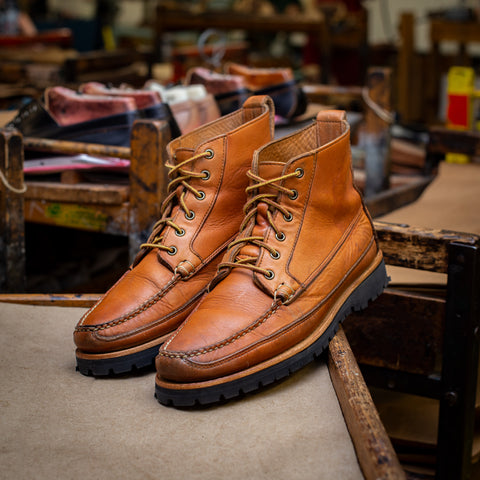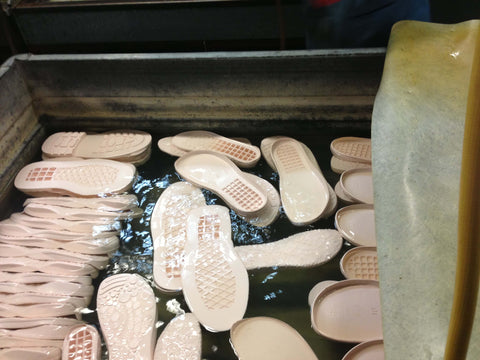Ìı
OBµç¾º & Co. isÌıproud to introduce the launch of its "Maine, the Way Fall Should Be" campaign. Inspired by the unparalleled scenic beauty and historic charm of our home state, our Fall-Winter collection is a tribute to the season's festive spirit. The campaign spotlights new products sourced and designed with the highest quality materials, and committedly crafted to honor and preserve OBµç¾ºâs 57-year-old shoemaking tradition while incorporating some unexpected new details.Ìı
This Collection welcomes our newest seasonal color, Driftwood; a wonderful waxy, rugged suede called waxy commander from C.F. Stead in England. This leather is weather resistant, and has a depth of character seldom seen anywhere else. The Menâs Collection also introduces new styles throughout the overall assortment, from additions to our boot lineup and casual moccasins, to updates to our Blue Isle Cordovan Collection, along with many holiday styles. The new materials and designs share direct lineage to OBµç¾ºâs reputation for timelessness and quality. Theyâre crafted to provide our customers with exactly what they need for every moment of the day.Ìı

Sunday September 22 welcomed the Autumnal Equinox; the air has cooled and the clocks are about to change, but thereâs still so much to explore and do in our beautiful state of Maine. Weâve pulled together a list of some of our favorite fall destinations to bring you on this journey throughout our wonderful state. Travel with us weekly as we highlight these special places, accompanied by our exciting new fall products.

Weâll start and end our journey in Lewiston, home of OBµç¾º & Co., and three generations of the OBµç¾º family. Our first stop, perched on the highest point in Lewiston, is Thorncrag Bird Sanctuary. Mike, OBµç¾ºâs Founder and CEO, grew up only two blocks away from this 450 acre preserve. He spent countless childhood days catching pollywogs and building rafts while exploring this adventureland. Nicknamed âthe Crag,â is a well-loved landmark in the city, and offers hiking trails, resting areas, and remnants of old stone fireplaces and gathering spaces that were in use over 100 years ago.ÌıÌı

We hope you enjoy virtually exploring Thorncrag and our initial Driftwood Collection launch. Please continue to follow us each week as we share New Products and Maine experiences on our journey through, âMaine, the Way Fall Should Beâ
Our second stop on our journey - Lewiston's Bon Vivant Restaurant shares our passion for Maine, the community and a product that is handcrafted and locally made.
For our second stop in our âMaine, the Way Fall Should Beâ journey, we take you to one of our CEO and founder's favorite restaurants,Located in the heart of downtown Lewiston, Maine, the delightful Bon Vivant embraces the spirit of creativity with an ever-evolving menu showcasing the best local ingredients. Chef Michael Gosselin, a Lewiston native, serves up intriguing New American dishes with a decidedly French influence.
ÌıBon Vivant is the proud creation of the innovative team that launched an exquisite speakeasy-style cocktail bar, in the basement of the same building in 2018. A year ago, they expanded to create Bon Vivant, a full-service restaurant above their existing establishment. With a commitment to excellence, the team strives to provide top-notch cuisine, a thoughtfully curated wine selection, and impeccable service with a chic and inviting ambiance.

Steeped in history since 1895, the building housing Bon Vivant was originally part of a vibrant French-speaking neighborhood. The team installed a brand-new kitchen, an inviting Art Deco bar, and seating for 50 in a room that feels current but not pretentious; exposed-brick walls, fun patterned wallpapers, and bits of décor from local thrift shops.
On our most recent visit, we ordered Mike OBµç¾ºâs favorite drink, an Old Fashioned.

Later, sitting by the window table, we enjoyed local Bangs Island Mussels steamed in a rich broth of Allagash White beer, onions, leeks, garlic, preserved lemon, coconut milk, and herbs, served with perfectly grilled bread. We chose âSteak Fritesâ for our entree, featuring a tender Black Angus, 10 oz. New York Strip with house-made bleu cheese butter and hand-cut French fries served with garlic aioli.

It was a meal befitting their credo, âbon vivant, come live well with us.â
Ìı
At OBµç¾º, itâs our ethos, too, to share with you, our extended family, the highest-quality products and experiences rooted in generations of unwavering devotion to craftsmanship and comfort. We hope you enjoy the newest additions to This Collection.Ìı

And that youâll continue to join us as we move on to our next stop in our Fall Journey â¦â¦â¦..
]]>





 Ìı
Ìı Ìı
Ìı






























 Our favorite footwear to wear is almost always equipped with Reltex Lactae Hevea outsoles. Despite LH footwear being a bit more expensive than some of our others we feel it is well worth the extra money. Lactae Hevea soles are made from all-natural rubber, and extremely comfortable, and offer a great balance of comfort and durability.Ìı
Our favorite footwear to wear is almost always equipped with Reltex Lactae Hevea outsoles. Despite LH footwear being a bit more expensive than some of our others we feel it is well worth the extra money. Lactae Hevea soles are made from all-natural rubber, and extremely comfortable, and offer a great balance of comfort and durability.Ìı









































































